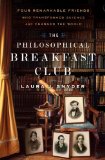Write your own review!
Mary G. (River Forest, IL)
Great Science But Connections Broke Down
It's an extremely well researched book about the four men who helped science establish standards for the science community in the 1800's. I had difficulty, however, with the author's time lines. She jumped around too often, leaving the human theme hanging, leaving the reader waiting for the story line to arc back and complete its original direction. Sometimes, she didn't make it back. Granted, chapter 12 does a great job of summing up the scientific matter. Even there, though, she made me wade through pages of science that had little to do with wrapping up the story of the four men who made it all possible, so I felt a bit let down. I admit that science isn't my particular bag and, in that case, I need a good story to push the boundaries of my horizons.
Jerry W. (Waxhaw, NC)
Scholarly But Accessible
This scholarly but very accessible history of science in the early nineteenth century centers on four young Cambridge undergraduates, William Whewell, Charles Babbage, John Herschel, and Richard Jones, who meet for breakfast on Sundays in 1812 to discuss their passion for "natural philosophy" (science) and their equally strong passion to reform how science is done.
I found the book an enjoyable read, at first. It was informative, fascinating, and not difficult reading. However, about a 1/3 way through the book I lost much interest. Maybe it was me and not the book. Anyway, check it out. I could be just the book for you.
Karen M. (Great Falls, VA)
The Philosophical Breakfast Club
Make no mistake about this book, it is a scholarly work, heavily footnoted, and in my opinion reads more like a dissertation than a nonfiction book for the public. The subject matter is the birth of the profession of the "scientist," formerly known as the "philosopher." In the early 1800's, four young men, William Whewell, Charles Babbage, John Herschel and Richard Jones, met as students at Cambridge and decided it was time to change the world. They arranged for regular "breakfasts" to address the importance of Blaise Pascal and Francis Bacon's discoveries, to carry out reforms in science and math seen in the last two centuries, and to create a role for both observation and reasoning in science.
The author, Laura Snyder fills the book with the lives and accomplishments of all the key players at the time, including Samuel Coleridge, Ada Lovelace, and Lord Byron, and how their paths continued to intersect. But the story is dry and requires an attention span that I do not possess. I am accustomed to reading dry material (I'm a lawyer), I've studied the society and writings of the 1900's, and I'm fascinated by the history of science. And yet, the writing did not catch fire at any point in the book. As an example of the writing style, under the promising chapter title of "Mechanical Toys," we learn that the "obstacle for Schikard's machine was that the force required to execute a ripple carry tended to be so much as to destroy the gear wheels. If a 1 is added to 999,999, then the force of the initial movement of the rightmost wheel had to be enough to turn all the other wheels up to the last one. Babbage realized that there had to be a way of allowing the carry in a different way, without the transmission of the initial force, in order to enable a calculating device to work on numbers twenty, thirty, forty, or even fifty digits long."
The author, Ms. Snyder, writes in a very detailed, serious, scientific style. There are no highs, no lows, no character development, no pacing, no descriptive phrases, no tension, no resolution, and no narrative voice that carries us through this very slow book. Most important, there is no sufficient levity to brighten the bleak process of plodding through the chapters. If you are hoping for user-friendly writing present in the writings of Brian Greene, Stephen Hawkings, or Dana Sovel, this is not the book for you.







